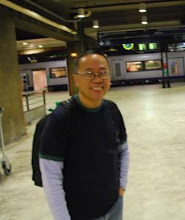APOSTLE'S CREED. Ceremony of the Apostles' Washing of the Feet. ca. 1955. Pampanga.
Every year, during Holy Week, Pampanga’s devouts are not only treated to a spectacle of saintly characters during the traditional processions, but they are also introduced to a host of biblical personalities—the angels of the Resurrection, Roman centurions, and perhaps the most visible and busiest—the twelve apostles of Christ, personified by select male members of the community.
To be chosen as one of the disciples of Christ was an affirmation of one’s respectability and standing in local society. Once chose, an apostol has to fulfill a vow or panata of carrying out whatever responsibilities and duties are assigned to him during the entire Lenten season. First comes the assumption of the identity of a particular apostle’s name. No fast rules are observed in the naming of the chosen apostoles—although the title of San Pedro often goes to the most senior member and San Juan, to the youngest.
The members of Christ’s court are then given white sutanas to wear, with sashes of different colors that often have their written names on them for proper identification—not unlike pageant sashes that proclaim one’s beauty title: Miss Universe, Miss International, Mutya ning Kapampangan and so forth.
Nowadays, like in my city of Mabalacat, Pampanga parishes garb their apostoles with robes that adhere strictly to the liturgical colors assigned to every apostle saint: deep yellow and green for San Pedro, red and green for San Juan.
On Palm Sunday (Domingo de Ramos) , the apostoles make their first major appearance: they accompany the parish priest in the re-enactment of Jesus’ triumphant entry into Jerusalem as he enters the church to a throng of palaspas-bearing churchgoers.
Once inside, the apostoles enjoy preferred seating in the church, occupying the front pews or chairs in the altar area. It will also be the first time for the parishioners to scrutinize up close the chosen twelve, often with a touch of amusement, as it’s not every day that one sees a neighborhood grocer dressed up like San Andres or Santo Tomas. Hushed arguments would be heard in the church as to aptness of the role assigned to this person who is deem either“ too short.. too fat..or has no hair”, and so on and so forth.
On Maundy Thursday, the apostoles are in full force again as they participate in the “Dakit Cordero”. Held in mid- afternoon, the apostles lead the way in fetching the holy lamb of God , shaped from flour, kamote or potato, from the house of a designated hermano. They accompany the cordero, conveyed on a tray by the hermano, to the church, where it is blessed.
The afternoon event culminates with the celebration of the Mass of the Last Supper, that features the procession of the Blessed Sacrament and its enshrinement at the monumento or Altar of Repose . Here, the apostoles are put on spotlight with the traditional washing of their feet by the priest, in imitation of Christ’s act of humble service.
The apostoles, smartly dressed in robes and sporting newly-shined shoes, fresh socks and professional pedicure take to the altar for this sacred re-enactment, attended by a gawking audience and a flurry of camera flashes. Must-join too, are the processions for both Miercoles Santo and Viernes Santo.
At the latter, the apostoles escort the most important figure of the prusisyun, the Santo Entierro or Apung Mamacalulu, the carved figure of the dead Christ encased in a gilded and flower-bedecked calandra. It simulates a real funeral procession, winding along the town’s main street and ending in the church. Easter Sunday will find the apostoles busy too, as they participate in the ritual of Salubong, in a show of solidarity with their Master and of course, the people.
For an apostol, there’s not an idle moment during the season of Lent. Though just a temporary role lasting no more than a week, it is a role that he embraces and takes seriously, a special privilege to serve God and humanity in a way that emulates and imitates Christ. Lucky indeed is he, for as Christ himself proclaimed, many are called, but few are chosen.









1 comment:
Post a Comment